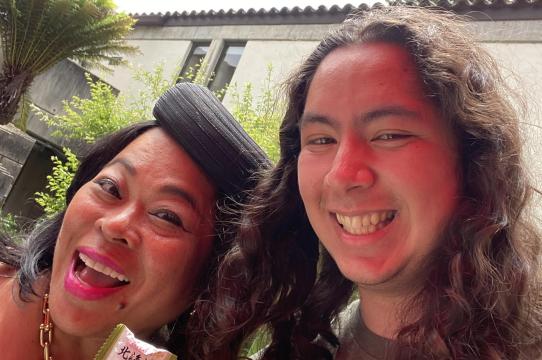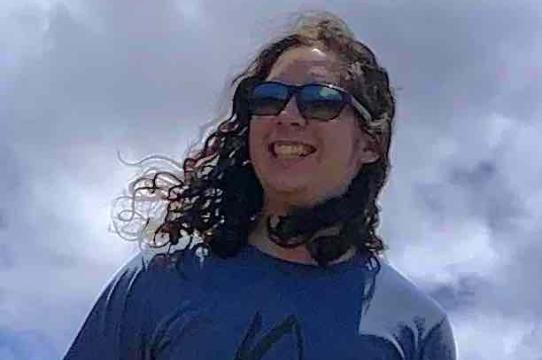In the 2022-23 academic year, Jaxon Chester loved being the Media Production Team Leader for the Okinawa Memories Institute (OMI), a public history research project at UC Santa Cruz. This academic year, in 2023-2024, he is the lead intern, a job he shares with Geneva Samuelson, which oversees the undergraduate side of OMI
“It’s a fantastic position to have,” he said. “I work with a lot of great people and do meaningful work.”
Chester works with the others at OMI to tell the life stories of Okinawans. They travel to Los Angeles regularly, he says, mainly to interview members of the Okinawa Association of America . Chester does the camera and technical work for the interviews with his team.
Chester started doing this work when he got an email from OMI saying they were looking for people with media production skills, which Chester, who is studying digital media and global economics, has. Chester grew up in Maui and the parallels between the two cultures interested him.
“Okinawa has similarities to Hawaii in that they both have a history of military occupation and of cultural suppression especially through their native language,” Chester said. “The language of the main island, Okinawa, is Uchināguchi. A lot of people consider it to be a dialect of Japanese, but the more I learn about it, it’s clear to me that saying Uchināguchi is a dialect of Japanese is like saying Hawaiian is a dialect of American English. They’re not similar whatsoever. People that speak one do not understand the other.”

The more he learns about Okinawa, the more he learns about where he grew up, Chester says. That’s what led to his research project exploring “contemporary Okinawan & Hawaiian material cultures,” for which he was named a 2022-2023 Koret Scholar.
The name of the project is Chanpurū, an Okinawan stir fry dish.
“To me, it's kind of representative of how, as a culture, they're very accepting of outside influences, and they sort of adopt these things and incorporate them into their own culture,” Chester said. “Chanpurū is very similar to Hawaiian plate lunch in my mind — in that it’s an amalgamation of a bunch of different cultural influences that kind of come together to form this new dish or this new sort of identity.”
For his own research project, Chester says he used the skills he learned working with the OMI to ask people about their life stories.
“Talking about food and what they ate growing up was a nice way to get people comfortable,” Chester said. “People were very open and helpful. To quote one of the people I interviewed, ‘Hawaiian is a language of love,’ which I found to hit home. Culturally being Hawaiian is all about sharing and teaching others.”
Chanpurū will be on hold for a little bit while Chester spends the quarter in Barcelona, where he will be taking classes in globalization, financial risk management, and Spanish, for his degree in global economics.
Chester, who is also an accomplished musician, says he started to see that video production could be a career for him in his junior year in high school. And going to UC Santa Cruz and working with the OMI has reinforced that belief.
“I like to tell people I moved from beaches and trees to beaches and trees, except the beaches are better in Maui, and the trees are better in Santa Cruz,” Chester said. “It's really just been quite an excellent fit for me.”


